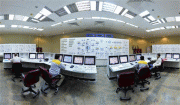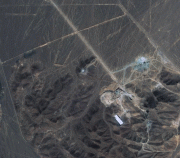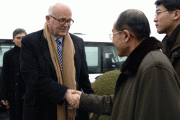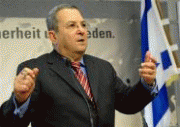
In this Monday, Nov. 30, 2009 photo released by the semi-official Iranian Students News Agency (ISNA), Iranian technicians, work with foreign colleagues at the Bushehr Nuclear Power Plant, just outside the southern port city of Bushehr, Iran. Iran's announcement of plans to build 10 more uranium enrichment facilities is largely bluster following a strong rebuke from the U.N.'s nuclear agency, according to analysts. Nonetheless, the defiance is fueling calls among Western allies for new punitive sanctions to freeze Iran's nuclear program. U.S. and European officials were swift to condemn the plans, warning that Iran risked sinking ever deeper into isolation, but Iran responded that it felt forced to move forward with the plans after the International Atomic Energy Agency passed a resolution Friday demanding that it halt all enrichment activities.

Iran revealed in September it had been building a second uranium enrichment plant inside a mountain near Qom

U.S. President Barack Obama's special envoy for North Korea, Stephen Bosworth, being welcomed by an unidentified North Korean official, right, upon arrival at Pyongyang airport, North Korea. Another year has passed in the world's standoff with Iran and North Korea over nuclear weapons, and the situation has only gotten worse. Both countries have pressed ahead with their programs, while the U.N. has stuck to sanctions that seem to have little if any effect, and a slew of other countries are now seen as candidates for the nuclear club.

Israeli Prime Minister Benjamin Netanyahu pauses during a meeting of the Foreign Affairs committee, at the Knesset, Israel's parliament in Jerusalem. Netanyahu testified at the committee about Israel's interest in preventing Iran from obtaining nuclear weapons. Another year has passed in the world's standoff with Iran and North Korea over nuclear weapons, and the situation has only gotten worse. Both countries have pressed ahead with their programs, while the U.N. has stuck to sanctions that seem to have little if any effect, and a slew of other countries are now seen as candidates for the nuclear club.

Israel's Defense Minister Ehud Barak speaks at a news conference after his meeting with Austrian counterpart Norbert Darabos, not on picture, in Vienna, on Monday, Dec. 14, 2009
Israel's defense minister urged the world Monday to agree to tough new sanctions on Iran, suggesting that military strikes remained a final option should Tehran refuse to heed U.N. Security Council demands to curb its nuclear activities.
Ehud Barak indicated Israel was prepared to wait for an unspecified period of time to give more space to world power diplomacy in trying to end Iran's nuclear defiance.
"We still believe that its time for diplomacy, tough diplomacy," Barak told reporters during an official visit on the invitation of Norbert Darabos, his Austrian counterpart. "There is a need for tough sanctions ... something that is well and coherently coordinated to include the Americans, the EU, the Chinese, the Russians, the Indians."
At the same time, he said, "we recommend to all players not to remove any options from the table," just as "we do not remove it."
Both Israel and the U.S. administration have said all options remain — diplomatic language for military strikes — in attempts to strip Iran of the capability of turning what it says are peaceful nuclear activities into a program geared toward making nuclear arms.
Israel in particular is growing impatient after seven years of failed attempts to strip Iran of its capacity to make nuclear weapons.
During that time, Iran has moved closer to that status, even while insisting that its atomic program is meant solely to generate energy.
Its thousands of centrifuges have produced enough enriched uranium to produce two nuclear weapons — even though it maintains the stockpile will only be used for nuclear fuel and not for weapons-grade material.
It has only recently — and belatedly — revealed that it is building a second enrichment site and is stonewalling an International Atomic Energy Agency probe of allegations that it had experimented with making nuclear weapons.
As well, Iran threatened earlier this month to expand its enrichment program tenfold, while rejecting an IAEA-brokered plan to supply fuel for its research reactor if Iran exports of most of its enriched stockpile — a move that would strip it of its warhead material.
The White House has said Iran has until the end of the month to accept that plan and Barak suggested that Israel was willing to give the U.S. more — but not indefinite — time in mixing outreach toward Iran with the threat of further sanctions.
"There should be a time limit for all these attempts to block them through sanctions," he told reporters, warning that an Iran armed with nuclear weapons "will clearly ... initiate a nuclear competition."
"Think of Egypt, or Turkey or Saudi Arabia," he said. "They can hardly afford not being nuclear if Iran turns ... nuclear."
IRAN is making nuclear bom componenets.
Iran is working towards testing a key final component of a nuclear bomb, British newspaper The Times said Monday, citing confidential documents.
The daily said it had obtained notes describing a four-year plan to test a neutron initiator, the component of a nuclear bomb which triggers an explosion.
The Times claimed that foreign intelligence agencies dated the documents to early 2007 -- four years after Tehran was thought to have suspended its weapons programme.
The technical document describes the use of uranium deuteride -- a neutron source, said the newspaper.
Uranium deuteride is thought to have no possible civilian or military use other than in a nuclear weapon.
In the view of experts contacted by the newspaper, Iran's work in this field "has no possible civilian application. It makes sense only for a programme to develop a nuclear weapon," the Times said.
A picture of the document, written in Farsi, was printed inside the newspaper.
The Times said the documents detailed a plan to test whether the device works -- without leaving traces of uranium that the outside world could detect.
A spokesman for Britain's Foreign Office said: "We do not comment on intelligence, but our concerns about Iran's nuclear programme are clear and based on information in the public domain.
"The International Atomic Energy Agency (IAEA) has made clear that it cannot verify Iran's nuclear programme is for exclusively peaceful purposes," he added, saying the recent revelation of a facility at Qom "was further blow to confidence and trust in Iran's intentions."
Iran, which is already enriching uranium in defiance of UN sanctions at a plant in Natanz, revealed in September it had been building a second uranium enrichment plant inside a mountain near the Shiite holy city of Qom.
The disclosure of its existence triggered widespread outrage in the West, which suspects Iran is developing technology to enrich uranium to highly refined levels to covertly build a nuclear bomb.
Tehran vehemently denies the charge, saying its nuclear programme is for peaceful purposes only.
Iran is under three sets of sanctions for refusing to halt enrichment.
Mark Fitzpatrick of the International Institute for Strategic Studies think-tank, told the Times: "The most shattering conclusion is that, if this was an effort that began in 2007, it could be a casus belli.
"If Iran is working on weapons, it means there is no diplomatic solution.
"Is this the smoking gun? That's the question people should be asking. It looks like the smoking gun. This is smoking uranium."
RELATED POSTS:-
- 5 charged after NKorean weapons seized in Thailand
- World gathers for the largest climate summit in demark.
- UNICEF urged the world to help the 1 billion children still deprived of food, shelter, clean wa
- Keep us safe or we're off for good — UN pulls out staff after attack
- After Afghan vote, an awkward task for Obama
- Afghan Election Officials Declare Karzai Winner
- UN chief in Kabul as pressure mounts over run-off vote-Abdullah Abdullah quit 2nd election becoz Kanzai refuse sack corrupt Election officials.
- UN chief slams deadly attack on UN guest house in Kabul
- Karzai needed convincing twice on new election
- US condemns bombing outside Indian embassy in Kabul
- Israeli says some time left for diplomacy on Iran-Urge for tought sanctions-AirStrike is an option.
- US says 'nothing new' in Iran nuclear offer-Iran going to face sanctions
- Iran releases 5 British sailors detained at sea
- Iran plan to expand nuclear program go against world powers.Cause tension.Rejected IAEA. Plan to build 10 more nuclear plants.
- Iran faces consequences of refusal to end Nuclear issues with US as world deliberate what to with Iran.-Rejects IAEA resolution as politically plot
- U.N. Official Seeks Global Action on Iran-Refuse to sent enriched uranium to Russian for processing.
- U.S. authorities to seize four mosques and 36-storey New York skyscraper that are 'under secret control of Iran'
- Diplomats: Iran agrees to draft deal on uranium
- Missile tests underscore the threat Iran poses in Mideast-Isreal ,US bases in the Middle East, and southeastern Europe are within range-To provoke USA
- Exclusive: Salehi sheds light on purpose of nascent nuclear site





0 comments:
Post a Comment